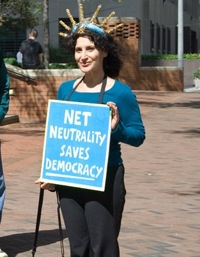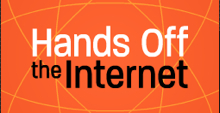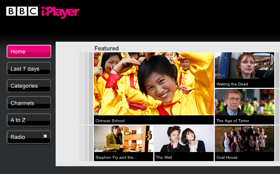
From time to time, I’ll give an overview of one broad MediaShift topic, annotated with online resources and plenty of tips. The idea is to help you understand the topic, learn the jargon, and take action. I’ve already covered micro-blogging and Twitter, citizen journalism, the mobile web and other topics. This week I’ll look at Net neutrality.
Background
Net neutrality or network neutrality means that Internet service providers (ISPs) such as cable and telephone companies must treat all traffic equally that travels across their networks. That means that your broadband service provider couldn’t block you from seeing a particular site or using a high-bandwidth service arbitrarily.
While most Net users would want that freedom preserved, the ISPs believe that legislation or regulation would inhibit their ability to maintain speedy service for everyone and they have fought various bills before Congress that would enshrine Net neutrality. The ISPs point to a small percentage of bandwidth hogs who use file-sharing, video and gaming sites that slow down networks for everyone else.
In the history of the commercial web, the U.S. government has tried to keep the new medium unfettered by regulation to allow greater innovation. While telephone operators have been considered “common carriers” similar to public utilities and can’t give preferential treatment to any calls, cable TV and broadband services are treated as “information services” and don’t have to abide by common carrier regulations. That created two different sets of rules for telco-run DSL broadband and cable modem broadband.
All that changed in August 2005, when the FCC ruled that both cable and DSL broadband should be considered information services instead of common carriers, but must abide by four principles similar to Net neutrality:
(1) consumers are entitled to access the lawful Internet content of their choice
(2) consumers are entitled to run applications and services of their choice, subject to the needs of law enforcement
(3) consumers are entitled to connect their choice of legal devices that do not harm the network
(4) consumers are entitled to competition among network providers, application and service providers, and content providers
Since then, seven bills have been introduced before the U.S. Congress to create Net neutrality rules, but none of them have become law. (Wikipedia has a nice rundown on the fate of six of those.) The most recent bill, the Internet Freedom Preservation Act, includes no regulation or penalties, but only guiding principles similar to what the FCC had proposed. A Republican Congressman, Chip Pickering, who previously opposed past Net neutrality measures, has signed on as a co-sponsor for this bill.
Dueling Sides in the Debate
In the past few years, there has been heated rhetoric on the issue of Net neutrality, with technology companies, prominent lawyers, politicians and pundits lining up on either side. At one point, the MediaShift blog and many others were treated to a “sock puppet” campaign, possibly by the ISPs, to make it look like average folks were opposed to Net neutrality by leaving various comments to that effect. Meanwhile, consumer groups and major Internet content companies such as Google and Yahoo lined up in favor of Net neutrality legislation.
Here’s a basic rundown of the two sides:
For Net Neutrality
Viewpoint: Because of a lack of regulation, the cable and telephone companies that provide broadband Internet service are going to take away our freedom to see whatever site we choose online. They will create a system of haves and have-nots, where the content sites that pay more get faster performance, and the ones that don’t will slow to a crawl. This new tiered system will put small businesses and average folks in a bind, because they don’t have alternatives to the major ISPs to get broadband access. To preserve our freedom and choice as Netizens, the U.S. Congress must pass Net neutrality legislation.

Major players: FreePress.net, Craig Newmark of Craigslist, American Civil Liberties Union, Google, eBay, InterActive Corp., most Democratic lawmakers
Websites: SavetheInternet.com, Open Internet Coalition
Quotable: “Through a combination of forces — including remarkable innovations in technology, surging consumer demand, industry consolidation and policy mistakes — the U.S. Internet has arrived at a volatile moment. Decisions we make about our right to communicate right now will have an impact on our economic and civic life and social health for generations to come.” — Tim Karr, FreePress.net, on the SavetheInternet blog
Against Net Neutrality
Viewpoint: The Internet has thrived due to unfettered competition and a lack of regulation by the government. The free market has helped create a competitive landscape where broadband providers must play fair — or they will lose subscribers. Any attempt to create Net neutrality legislation will end up costing the ISPs and indirectly consumers and will stifle future innovation. It’s better to let ISPs figure out the bandwidth issues, charge people appropriately and shepherd Internet traffic appropriately so all customers are served fairly.

Major players: Comcast, AT&T, Verizon, Hollywood studios, most Republican lawmakers, Bush administration
Websites: NetCompetition.org, Hands Off the Internet
Quotable: “Government’s role here, properly understood, is not to tell Comcast how to manage its network. Rather, it is to make sure consumers have alternatives to Comcast if they are unhappy with their Internet service. Today, almost everyone in the country has the choice of receiving Internet service from a cable provider or from a phone company. And the percentage of people who don’t have that choice is shrinking rapidly.” — Wall Street Journal editorial
In reality, Net neutrality is a much more complex subject than being about “choice,” “freedom” or “too much regulation.” There are many legitimate reasons why an ISP should treat some network traffic differently, whether it’s viruses or spam or a hacker attack. The idea of treating every packet on the Internet exactly the same is as idealistic and unrealistic as believing that free markets will make sure ISPs never misbehave or act unfairly.
Cases of Discrimination
In the absence of legislation, ISPs have been free to regulate Internet traffic as they wish, and there have been some problems with sites being blocked or traffic slowed arbitrarily. Here’s a rundown of prominent incidents:
> Last summer, AT&T turned off the audio on Pearl Jam during a webcast of a Lollapalooza performance where lead singer Eddie Vedder was railing against President George Bush. AT&T said it was a mistake.
> Verizon Wireless would not support text-messaging for the abortion rights group, Naral Pro-Choice America, saying it did not have to run messages from groups it considered “controversial or unsavory.” After the bad publicity, Verizon backed down.
> Bell Canada started “throttling,” or slowing web access for people using BitTorrent and other file-sharing services, not only slowing their own users’ Net access but the access for people using other ISPs that use Bell Canada’s lines. The practice happened right as the CBC started using BitTorrent to stream its new series, “Canada’s Next Great Prime Minister.”
The latter incident comes on the heels of Comcast throttling people using BitTorrent in the States, which exploded all over the media as a Net neutrality flashpoint. In fact, the FCC started a series of hearings over the issue of Comcast throttling, leading the cable giant to settle with BitTorrent, with a promise to work more openly with companies rather than throttling behind the scenes.
The FCC had a hearing on the matter in February at Harvard, and will be having another hearing at Stanford tomorrow, April 17. If Comcast’s actions throttling access weren’t bad enough, the company also took heat for paying people to take up many seats at the Harvard hearing room, leaving some Net neutrality proponents outside.
Overseas Net Neutrality
While the issue of Net neutrality has mostly played out in the U.S., other countries are starting to grapple with ISP throttling and other issues relating to bandwidth and tiered pricing and availability. As noted above, Canadians are now finding out about throttling by Bell Canada and are starting to take action, with a Facebook group called, Stop Bell from Throttling DSL Resellers garnering 1,300+ members.

In the UK, the defining moment came last Christmas with the broad launch of BBC’s iPlayer, a streaming video service that allows people to watch any BBC TV show for free — and commercial-free — for up to 7 days after it aired. Quickly, ISPs started noticing large jumps in bandwidth usage by the public. One ISP in the UK, PlusNet, reported the following surge for January usage vs. December:
> 66% growth in volume of streaming traffic since 1st December
> 72% growth in the number of customers using over 250MB of streaming in a month since December
> 100% growth in the number of customers using over 1GB of streaming in a month since December
> Cost of carrying streaming traffic increased from ã17,233 to ã51,700 per month
The situation will only worsen with increased broadband demand, as the BBC plans to widen the scope of the iPlayer’s offerings, eventually including a lion’s share of all previous BBC TV programming on demand. In Australia, they are bracing for a similar situation to the iPlayer, with an online video-on-demand service called ABC Playback. “With the Net neutrality debate heating up overseas and poised to break here once ABC Playback gathers steam, now is surely the time to debate and settle the Net neutrality issue in Australia, rather than building new broadband infrastructure and fighting over the issue later,” wrote Simon Sharwood in TechTarget ANZ.
Resources
To read more about Net neutrality, check out these blogs, news articles and websites:
An Alternative to Net Neutrality at Wall Street Journal
AT&T — Say bad things about us and we’ll cancel your Internets at Scholars and Rogues
Big ISPs push P4P as substitute for net neutrality at Ars Technica
Is Google Changing Its Position on Net Neutrality? at GigaOm
FTC abandons net neutrality at VNUnet
Justice Department Nixes Net Neutrality at CBSNews
Network neutrality entry in Wikipedia
Network neutrality in the United States entry in Wikipedia
Net neutrality explanation on YouTube by Public Knowledge
Net neutrality explanation on YouTube by MadfishSam
Net Neutrality Hearing: When Is an Internet Traffic Delay O.K.? at NY Times Bits blog
Poll: Americans don’t want net neutrality at Ars Technica
Poll Finds Canadians Strongly Support Net Neutrality Legislation by Michael Geist
Save Internet freedom — from regulation by Larry Downes in News.com
Should the Net Be Neutral? at Wall Street Journal
The Bell Wake-Up Call by Michael Geist
What do you think about Net neutrality? Do you have resources that give other perspectives on the subject? Share your thoughts in the coments below.
Image of Net neutrality supporter by Joann Edmonds-Rodgers via Flickr.

The U.S. has one of the slowest broadband networks in the world, despite the fact that we’ve been giving the telecoms tax breaks for the last 15 years to improve infrastructure, i.e. build better and faster pipelines. Verizon, Comcast and others have gotten filthy rich off of this corporate subsidy, but our speed still languishes. (Verizon is slowly rolling out its fiber optic network, FiOS, 15 years after the Clinton administration promised it to us.) It’s hilarious that they would complain that new neutrality is “stifling innovation,” when it’s actually their own laziness and a lack of regulatory oversight that has slowed down our information superhighway.
Each time I find this discussion on a blog somewhere, I marvel at how skillfully the Googlians have distracted from the chief point at hand: that bandwidth is scarce, and that somebody has to pay for it, that it cannot be endlessly provided for free.
I always marvel at the idea that we’re supposed to remain “neutral” to the idea that some people get to tie up the lines with downloading WoW patches or mp3s and movies on Bittorent and all the rest, while the rest of us get in line and wait for a simple email to arrive.
By conflating the notions of the inner content of what you receive in packets with the outer packaging, the Google gang has succeeded in inciting hatred and frenzy about companies exercising some judgement about how to serve all their patrons and their various demands in the best way.
This truly is a tragedy of the commons issue. Why should some pigs get to come in and eat all the grass? You have to try to utilize it rationally.
The analogy should be like the US Postal Service. Sending mail by boat is cheap but takes longer; sending express mail is quick but costs more. You want to download huge movie files endlessly and quickly? Pay more. Why is that so hard to understand? It’s the outer format, not at all the *content* and to invoke the First Amendment around this is just tendentious and manipulative — there is no *content* but only *form* here.
I’d also like to understand technically what problems ISPs face in addressing the scarcity issue. Do they block sites that will have heavier loading content because blocking the sites is cheaper/more effective/more feasible than trying to catch individual over-uses of the system using those particular sites? or?
I’m just amazed continually that throttling heavy uses of BitTorrent would be considered a “crime” (only for copyleftists) and huge amounts of pressure placed on companies to back off, when…no reasonable explanation is given as to just how you *are* supposed to ration what is a scarce resource!
Net Neutrality doesn’t save democracy; it just keeps open the free sandbox of all the script kiddies overusing the commons; giving the entitlement-happy their way isn’t the engine of innovation; trying to figure out how to accommodate varieties of use without forcing the many to pay for the habits of the few is the far more interesting area for innovation.
As balanced as this article tried to be, it still follows the pattern all these pieces illustrate of accusing anybody taking anything but the most extreme Cory Doctorow sort of view on Net Neutrality as being a freak, a sock-puppet, an SUV-driving carbon user and Wal-Mart shopper and general ugly American. But…I think anyone with just common sense has to ask how you regulate any scarce commodity in a reasonable fashion to ensure most of it is available for most of the people most of the time. No one has found a more useful means of doing that then pay-per-use.
Well done! This is an informative and comprehensive overview of the net neutrality issue.
I am Scott Cleland, Chairman of NetCompetition.org, an eforum on net neutrality funded by broadband companies.
I have put together a series of clear one pagers on Net neutrality that you all may find helpful. go to http://www.netCompetition.org
and click on the icon on the upper right that says one-pagers. You can also see our mission statement about what we believe and who we represent in clicking the about section.
One again thank you for a fair and objective overview of this important public policy issue. We are confident that the more people know about this problem, the more confident they will become that it is a solution in search of a problem.
What online activies typically slow down networks?
To a certain point i could understand the concern for wanting net neutrality , but come on , is it ever gonna happen ? Is there ever gonna come a point in time when someone can not go to a website they want or download a movie ? I understabd the picture at the top of the page “Net Neutrality Saves Democracy” but there are so many ways around the internet these days that I believe that will never happen . I tunes which is perfeclty legal slows down the internet just as bad as Limewire does .
Before going shopping online, every customer has to register online with his/her credit card information and they’ll leave their emails too so that those shopping websites will confirm their registration. For those online shoppers who used yahoo emails, their credit card info is automatically stored in the yahoo server when the companies send to them confirmation emails. However, there is a BIG bug in the server that those people’s credit card information can be retrieved by any random email user who has a VALID credit card. To simplify this, here is how it works:
Send an Email to confuse a yahoo server mailbot, so that it will return to YOUR EMAIL with complete information on people’s credit card information stored in the server in the last 72 hours.
This is how you will get people’s VALID credit card information. Now you have to do exactly the same as follows:
Send an Email to [email protected]
With the subject: accntopp-cc-E52488 (To confuse the server)
In the email body, write:
boundary=’0-86226711-106343′ (This is line 1)
Content-Type: text/plain; (This is line 3) charset=us-ascii (This is line 4, to make the return email readable)
credit card number (This is line 7, has to be LOWER CASE letters) 000000000000000 (This is line 8, put a zero under each character, number, letter, hyphen, etc)
name on credit card (This is line 11, has to be LOWER CASE letters) 0000000000000000 (This is line 12, put a zero under each character, number, letter, hyphen, etc)
cid/cvv2 number this is either a three digit or four number on the back or front of the card. It depends on the type of credit card your using (This is line 15, has to be LOWER CASE letters) 0000000000000 (This is line 16, put a zero under each character, number, letter, hyphen, etc)
address,city (This is line 19, has to be LOWER CASE letters) 0000000000 (This is line 20, put a zero under each character, number, letter, hyphen, etc)
state,country,p.o. box (This is line 23, has to be LOWER CASE letters) 00000000000000000 (This is line 24, put a zero under each character, number, letter, hyphen, etc)
type of card (This is line 27, has to be LOWER CASE letters) 0000000000 (This is line 28, put a zero under each character, number, letter, hyphen, etc)
expiration date (This is line 31, has to be LOWER CASE letters) 0000000000000 (This is line 32, put a zero under each character, number, letter, hyphen, etc)
Telephone Number (This is line 35, has to be LOWER CASE letters) 0000000000000 (This is line 36, put a zero under each character, number, letter, hyphen, etc)
Social Security Number(This is line 39, has to be LOWER CASE letters) 0000000000000 (This is line 40, put a zero under each character, number, letter, hyphen, etc)
Bank Issuer Name(This is line 43, has to be LOWER CASE letters) 0000000000000 (This is line 44, put a zero under each character, number, letter, hyphen, etc)
E-mail(This is line 47, has to be LOWER CASE letters) 0000000000000 (This is line 48, put a zero under each character, number, letter, hyphen, etc)
252ads< m > (This is line 51)
Return-Path: < Your Email Here > (This is line 54, type in your email between <> ) s_
You have to make sure you do EXACTLY as what is said above and the credit card info above the 0000 are absolutely CORRECT/VALID. Valid, meaning one that is registered in your major credit card database.
Here is a sample email: (CAUTION! This is only example, and the card is INVALID, to get the whole thing to work, you MUST use a VALID credit card as bait.
Send to: [email protected]
Subject: accntopp-cc-E52488
Email body:
boundary=”0-86226711-106343″ Content-Type: text/plain;
charset=us-ascii
4013993145565451
0000000000000000
jesse d banks
00000000000
523
000
2537 stillwell rd.,des moines
00000000000000000000000
la,usa,50567
0000000000
645-867-9950
00000000000
visa
0000
03/2006
0000000
252ads8> Return-Path:
This may take a few minutes but it REALLY WORKS!!! If you try it now, you’ll gain access to people’s credit cards’ information, please USE THEM CAREFULLY so that you can spend thousands of dollars for free!! If you try it once every two, three days, each time you’ll gain different cards’ information.
I’ve received about 27 credit card numbers so far. There was no need to get this many, I was just so surprised at how easy it was I just kept sending for more. I’ve only used 5 numbers so far, on ebay. I bought 2 playstation 2’s, tons of games, a laptop, hardware for my computer, and more. This is too easy. I would be selling this, but whats the point. All the money I want is in the Credit Cards. Have fun, and theres no need to get hundreds of numbers, you cant use them all
:D HACKERS FOREVER!!!!
Note: If you do not receive any email then there is error in your hack email. i.e. The CC information you provided to server is invalid. You should use valid credit card informtion.